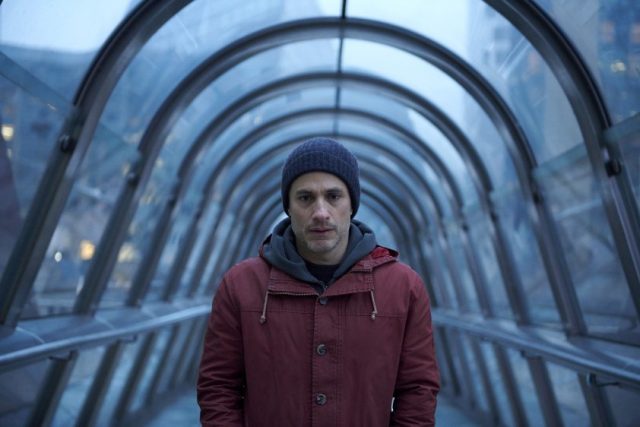It’s ironic that memory is the central theme of Piero Messina‘s Berlin Competition title “Another End,” when so many of its twists and turns are so directly lifted from other films that it feels like you’ve seen them before; even watching it for the first time feels like rewatching. But if that makes this elegiac literalization of the timeless theme of “what is grief but love persevering?” a rather edgeless experience it’s not a wholly unpleasant one. Less designed to provoke than to soothe, perhaps the very familiarity of much of the movie is a virtue, letting us enjoy its sleek surfaces safe in the knowledge that there’s nothing much lurking in the depths to alarm us.
Indeed, the story’s central alarming incident has happened some time before the film even begins: a car crash for which Sal (Gael García Bernal) believes he was responsible and in which his wife died. Unable to cope with his guilt and grief, Sal resorts to replaying her memories — a tech which this near-future society has perfected — and even attempts suicide. His sister Ebe (Bérénice Bejo), who is suspiciously tireless in her efforts to comfort him, encourages him to use the services of the company she works for, Another End.
At the company’s big gleaming facility, they can download a dead person’s memories into a consenting “host” essentially reanimating them in a different body. For a short time, you can have your loved one back. Apparently not realizing that we don’t tend to make the best decisions while in the throes of grief, and expressly against the wishes of his shattered father-in-law, Sal eventually agrees to the procedure. Lucky for him, the “compatible” body found to house his dead partner Zoe, is that of Ava (Renate Reinsve), whom we later learn is a stripper in a high-end fetish club who is carrying traumas and secrets of her own.
Aside from the obvious questions like whether someone’s memories really are them, and whether you would be able to be in the same love with a person in a different body, there are a bunch of ethical, practical and philosophical issues that this process throws up. Messina and his three co-writers Valentina Gaddi, Sebastiano Melloni and Giacomo Bendotti try rather inelegantly to account for them, by making up a mess of rules and conditions that don’t seem particularly based in the movie’s (fictional) science, many of which are delivered to us in explanatory speeches by Ebe’s sinister co-worker Doctor Doyle (Pal Aron), who apparently got his PhD in Exposition. So the download is only for a pre-arranged number of “sessions” — just enough, the company claims, to allow you to say a proper farewell, as though those exist. Hosts do not remember their own real lives while they are hosting, and do not remember their sessions when they return. Technicians come and pick up the host when they go to sleep so they can wake up, back as themselves in a big warehouse facility for no other real reason than that all the hosts unzipping and emerging from their white plastic cocoons makes for a coolly dystopian sci-fi image. And so on.
There’s a little of Kathryn Bigelow’s “Strange Days” here, a little of “The Sixth Sense” (an impression reinforced by the presence of Olivia Williams, playing another Another End client) and a lot of “Eternal Sunshine of the Spotless Mind.” But there are also less exalted touchpoints like “Surrogates” and other, better films from the more intimate end of the scale such as Christos Nikou’s “Apples.” But one way “Another End,” falls short of the pantheon it references, is that Messina appears less interested in the psychological effect that having more time with a vanished loved one would actually have on the grieving process, and more concerned with piling on the kind of twists that genre-literate viewers will likely have guessed long in advance.
Still, Messina’s studied, elegant filmmaking — already on display, like his preoccupation with grief, in his debut feature “The Wait” — lends a kind of smooth gravitas even to the parts of the story that least earn it, with Fabrizio La Palombara’s classy cinematography and Bruno Falanga’s achy, nostalgic score, peppered with soundtrack cuts that sound vaguely like something you remember hearing before, especially useful in that regard. And Bernal and Reinsve have such watchable faces — his all handsome and haunted, hers as fresh as a portrait on which the paint hasn’t yet dried — that it almost makes sense of the final shift in the film’s axis. As “Another End” moves into, well, yet another end, all the sci-fi scaffolding, rickety to begin with, falls away and its true intentions becomes clear. Though Sal and Ava’s relationship might necessitate a new Facebook status option as “it’s complicated” really doesn’t cover it, the movie itself is simply a romance, just one that Messina takes an extraordinarily long way round to get to.






















